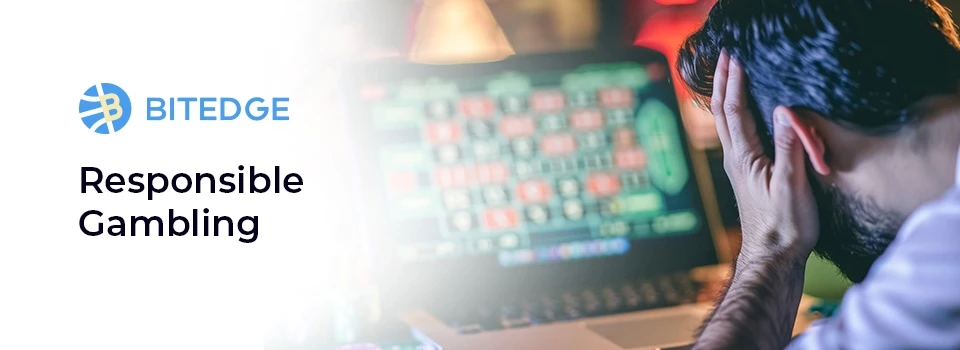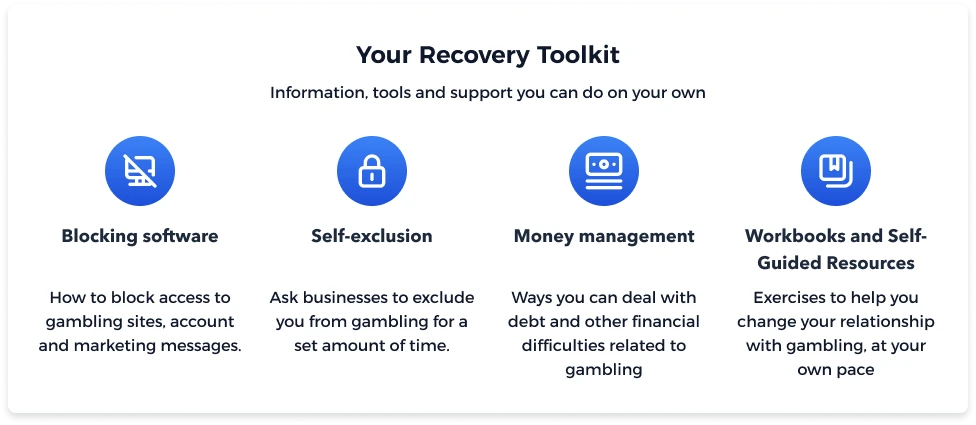What is Responsible Gambling?
Responsible gambling centers around the idea of social responsibility. It comes from several initiatives from different areas of the gambling industry. The operators, players, and regulators all hold a degree of responsibility.
Although many believe responsible gambling is only for problem gamblers, it encompasses betting sites behaving reasonably. For example, a betting site continuing to take deposits from a known problem gambler would be a failure on their part.

The Importance of Responsible Gambling
Responsible gambling is when you interact with casinos and know the risks involved. Responsible gambling is a safety net to protect players from putting their finances and well-being at risk while still enjoying the games they like!
To practice safe gambling and not lose sight of why you gamble, you can set these rules to help you stay on track:
What Is the Difference Between Responsible Gambling and Responsible Gaming?
In practice, there’s very little difference between responsible gambling and responsible gaming. However, as with any language, there is some nuance between the terms. Responsible gaming generally refers to the act of a bettor playing casino games. It’s a term most typically applied to casino games as a niche.
Responsible gambling is a blanket term that refers to all aspects of gambling responsibly, from sports bettors to crypto casino operators.
As a result, responsible gaming comes under the umbrella of responsible gambling.
Despite this, many sites will use both terms interchangeably. So, even though there are distinct differences between the two phrases, it’s essential to understand the context of their use. For example, if a sports betting site uses responsible gaming, it’s likely not referring to casino games. So, in this case, there’s a good chance it means responsible gambling.

What Limits Can I Set to Ensure Responsible Gambling?
Online casinos offer tools to help players practice responsible gambling and keep their patterns in check. Time and financial limits are difficult to undo in the first 24 to 7 days; otherwise, they defeat the purpose of setting them up in the first place.
Here are some of the tools casinos offer to their players:
Problem gambling is when casino gamblers develop a gambling addiction that transforms into a compulsive disorder.
➡️ Problem gambling can take many shapes, and gamblers should worry when they realize gambling is affecting their finances, personal relationships, and, ultimately, their well-being.
Only those who’ve faced gambling problems can understand how its compulsiveness affects them.
➡️ Typically, users are always seeking an adrenaline kick from gambling without any desire to stop and think about the negative implications it can have on their well-being.
Market Facts about Gambling
The global gambling market experiences record profits yearly, growing from $449 billion in 2022 to $702 billion at the end of 2023. In part, the online gambling market gambling market reached $95 billion in 2023 and is expected to reach $168 billion by 2032, primarily due to increasing access to internet technologies and digital natives.
In the past four years, active online gamblers have increased by 80 million users to 176 million. This is primarily due to North American regulators relaxing the laws for online platforms.
While North American markets bring in more revenue to the gambling markets, Asian-Pacific and African countries are expected to mirror the growth of American markets due to rising smartphone usage, where they can meet customer expectations.
Lastly, the Eastern European market is expected to reach a volume of $894 million in 2023 and a volume of $1.29 billion by 2028.
Europe | In Europe, the online gambling market is expected to reach $43.1 billion since each country regulates gambling in the EU. While strict regulations are set to protect users, players can gamble securely, resulting in a projected volume of $56.45 billion by 2028. The European gambling market is projected to have a CAGR of 11% from 2023 to 2032 and a valuation of $84 billion by the same year. |
Asia Pacific | In 2022, the Asia Pacific market was valued at $19.5 billion and is set to have a CAGR of 11.39% until 2028. This will be primarily due to growing access to online gambling websites but also to some regulation shifts. Japan has approved the development of its first casino resort, which is set to launch in 2029. What’s set to happen is to see a growing number of countries adopt gambling as a new revenue stream. Still, China, Japan, and South Korea are leading the way. |
North America | The North American gambling market has exploded in the past five years, with platforms like DraftKings’s aggressive marketing increasing and doubling the number of active online gamblers. The market has a projected growth rate of 11.3%, up to $34.68 billion by 2032. Changes in the regulatory landscape help facilitate its growth, primarily online. Compared to other regions, the United States will have the highest revenue, with $19 billion in 2023. |
The Middle East & Africa | The MEA region, which includes the Middle East and Africa, is valued at $16.2 billion and is expected to grow yearly by 8.1%. While the nations in the area have strict regulations, online gambling masked through off-shore entities allows gamblers to access gambling websites. There’s an expected growth of $5 billion by 2030 in the area, where the UAE and Saudi Arabia will take the lead in the Middle East and South Africa, and Kenya and Tanzania will become gambling hubs in the African region. |
1️⃣ Gambling becomes harmful when it transforms into an addiction that becomes uncontrollable.
2️⃣ Addiction causes harm by affecting a person’s life, finances, relationships, and mental health.
3️⃣ As a result, it can lead to people doing unimaginable things, including resorting to self-harm or harm to others.
4️⃣ If this is the case, gamblers who have an uncontrollable addiction should seek immediate help!
The Risks of Online Gambling
Gambling online inherently has risks. This is because the whole concept of gambling is risk vs reward. However, online betting can also introduce different risks to traditional gambling.
Bettors must be aware of these risks when betting online to avoid gambling problems further down the line.
We’ve looked closely at potential risks so bettors can be fully aware of them.
How to Spot a Gambling Addiction
Spotting a gambling addiction can be incredibly challenging not only for yourself but also for someone else. Our list makes spotting the tell-tale signs of a gambling problem easier.
🚩 You must gamble more and more to enjoy betting
🚩 Irritable when trying to reduce gambling
🚩 Consistently failing to control, cut back, or stop gambling
🚩 Always thinking about gambling, both past and future
🚩 Gambling, even when feeling upset
🚩 Chasing losses
🚩 Lying about how often you gamble
🚩 Putting gambling above your family, friends, jobs, or education
🚩 Using others to cover gambling costs
🚩 Bettors with four or more of these factors can be diagnosed with a gambling disorder.
What Are the Signs That Someone May Be Struggling with Their Gambling?
Financial problems, anxiety, and social isolation are signs that someone is struggling to keep their gambling addiction in check. Other telling signs include:
1. Financial signs
- Is always broke or asking to borrow money
- He’s borrowing money to fulfill his addiction
- Chasing losses with borrowed money
- Selling valuable assets
- Repurposing money to feed his addiction
2. Social signs
- Being mysterious about his activities
- Always keep his phone out of reach of others
- Using friends as family to feed his gambling addiction
- Isolates himself from family or personal relationships
- Asks friends to hold money for him to avoid gambling it away
3. Mental signs
- Always thinking about gambling
- Becoming anxious when not gambling
- Feeling depressed when he’s not gambling
- Irritated when he’s not able to commit to quitting
How to Check Your Playing History to Self-Assess Your Gambling Behavior?
Checking your playing history is a critical step to self-assessing your gambling behavior. It lets you understand your betting patterns, how much time and money you spend on gambling, and whether these habits may indicate a problem. Here’s how you can do it:
1. Review Your Financial Statements:
Look over your credit card and bank statements to determine the amount of money you have spent on gambling. This can give you an understanding of whether you’re spending more than you can afford.
2. Use Gambling Self-Assessment Tools:
Several online tools can help you assess your gambling behavior. The Gambling Self-Assessment Quiz by Safer Play, GamTest, and the 20 Questions by Gamblers Anonymous are among the resources that can help determine your risk.
3. Check Your Online Gambling History:
If you gamble online, most sites will have a record of your betting history. Review this to see how often you’re gambling and how much you’re spending.
4. Keep a Gambling Diary:
This involves keeping track of every time you gamble, including the date and time, the type of gambling, how much you bet, whether you won or lost, and how you felt before, during, and after gambling.
5. Seek Professional Help:
If you’re concerned about your gambling, consider reaching out to a professional, like a psychologist or a counselor trained in addictions. They can provide an assessment and guide you to appropriate resources.
The First Steps to Stay in Control
For bettors to stay in control, some simple steps can help. While every gambler is different, these steps can stop a gambling problem from becoming an uncontrollable disorder.
What to Do If You Can’t Gamble Responsibly?
If you can’t gamble responsibly, you need to stop gambling and accept that you have an issue that can become even worse.
The first step is to accept that you have a problem with gambling. It helps if you catch the problem before it gets serious. Analyze your behavior when you are gambling and how it affects your life, as it will help you understand the implications of your actions.
- Take action by blocking any access to gambling websites through self-exclusion. You can do that at any online casino. You also must call your bank and ask them for a gambling ban, which blocks payments to casino websites.
Make sure you discuss your problems with those close to you. Talk about the lack of responsibility on your part with the family or close friends. This will provide much-needed support to help you get over the struggles ahead.
- When you’re able to own up to your mistakes and issues, your healing and recovery process will be faster. If those close to you suggest professional help, you must start immediately.
How Can I Opt-in for Self-Exclusion?
You can start self-exclusion on any casino through the support section or the dedicated, responsible gambling page.
Below is a step-by-step process of how to do it:
What Support Is Available for People with Gambling Problems?
Problem gamblers can seek help from gambling-related NGOs in their country. Players in the US can access the National Council on Problem Gambling using their 24/7 confidential hotline: +1-800-522-4700.
Gamblers can access NGOs or government-backed organizations to help players with their addiction.
Below, we will share the most known NGOs that handle gambling addiction.
If you can’t access these organizations, you must search for the organization in your country that handles gambling problems.
There are many different sources where bettors can find help with gambling issues. Each one provides a different outlook on how to remain responsible when gambling.
🎧 Customer Support
👥 Online communities
🔊 Support groups
✔️ Gambling support organizations
🗣️ Professional therapists
What Can Casinos and Other Gambling Venues Do to Promote Responsible Gambling?
Gambling platforms can increase their efforts to promote responsible gambling through stricter rules on preventing and enforcing it.
These include:
| 1. Gambler education: | 🔹Casinos and gambling platforms must invest part of their revenue in educating gamblers about the negative effects of gambling addiction. 🔹These should be directed toward NGOs or organizations that help users with gambling addiction. |
| 2. PR Campaigns: | 🔹Similar to the first point, governments and stakeholders should work together to create effective communication campaigns to educate players further. 🔹Of course, it’s up to players to take action, but reinforcing the message will lead to fewer players becoming dependent on gambling. |
| 3. Ethical marketing: | 🔹The marketing activities of casinos have already been regulated. Governments and big tech have to limit the reach of gamblers to target problem groups. 🔹Platforms like Facebook and Google empower users not to be targeted for gambling ads. |
| 4. Prevent underage gambling: | 🔹Problem gambling starts at a young age. 🔹Monitoring and creating strict KYC gambling platforms can enforce their terms and conditions and prevent young players from exhibiting the thrill of gambling. |
| 5. Monitor problem gamblers: | 🔹Stakeholders should create stricter guidelines on how to enforce their casino activities. 🔹Additional staff or automation is needed to identify and inform problem gamblers of their actions. 🔹This can be done through targeted messages on the platform and through email. |
| 6. New gameplay design for responsible gambling: | 🔹Gambling venues and game operators should make access to self-exclusion, freeze-outs, and other responsible gambling features apparent. 🔹They should make efforts to include these options in every game and make them stand out. |
Conclusion
Gambling responsibly is a robust method of personally regulating betting. However, bettors must understand the responsibility doesn’t lie at their feet alone.
Therefore, choosing a crypto betting site that supports responsible gambling is also essential.
In addition, responsible gambling is a societal responsibility, so the synergy between regulators, operators, and bettors is critical.
Our guide will help all Bitedge bettors remain responsible and keep themselves safe when gambling.
Frequently Asked Questions
How Can I Block Gambling Payments From My Bank Card?
You can block gambling payment options on your credit card by calling your bank and informing them to block any payment requests from one or more providers. You can explain your situation to the operator, and they can activate a block on external payments or online casinos.
If you have a mobile app, some banks allow you to block and restrict payments coming from gambling websites. Another option is to search for past payments and block their payment provider.
What Can I Do if I’m Worried About My Gambling or Someone Else’s?
If you are worried that you or someone else is addicted to gambling, it’s important to acknowledge there is a problem. This is the most difficult part of the journey to recovery.
If you are struggling with gambling addiction, you need to admit to having a problem and seek immediate help. It starts with discussing with those close to you (such as family members or close friends) and seeking professional help from a therapist or a cognitive specialist.
If someone else has a gambling issue, then you need to bring it to their attention and be sensitive in the way you approach the subject.
Cognitive dissonance can come into effect, and the person can become defensive. The next steps include presenting the facts, listening to them, and understanding their situation, which will ease them into seeking professional help.
How Can I Block Gambling Payments From My Revolut Account?
You can enable the gambling block on any Revolut account from your mobile app. To do this, you have to:
- Login to your app with your password or Face ID
- Click on your profile
- Select the Security & Privacy option
- Click on Gambling Block to enable the block
- A new screen will appear, and you must click Yes to approve it.
How Can I Opt Out Of Seeing Gambling-Related Ads on Youtube?
- Type My Ad Center in the browser search box
- Log in with your Google account
- Turn on personalized ads by toggling the On button
- Click on Customize Ads on the left side panel
- Select the “Sensitive” ad types
- Look for “Gambling” and toggle the button off to show “Limited by you.”
How Can I Block Gambling Ads on Facebook?
- Open Facebook and select “Settings and Privacy.”
- Click on “Settings.”
- Search for “Ads” and click on “Ad Preference.”
- Click “Ad Topics” and search for Gambling or related terms









